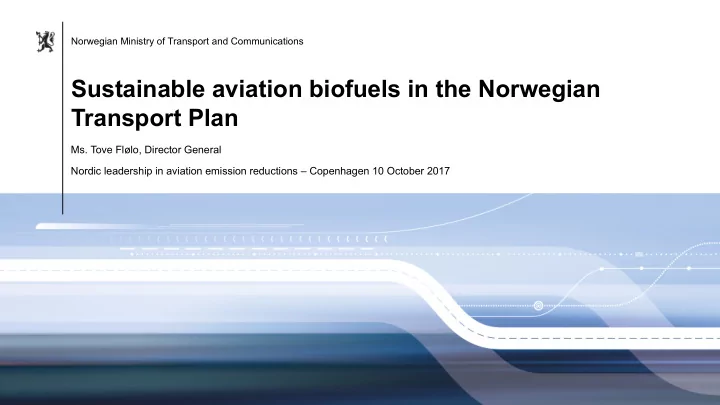

Norwegian Ministry of Transport and Communications Sustainable aviation biofuels in the Norwegian Transport Plan Ms. Tove Flølo, Director General Nordic leadership in aviation emission reductions – Copenhagen 10 October 2017 Norwegian Ministry of Transport and Communications
Norwegian transport policy and the environment • Goals of Norwegian transport policy • Adhere to Norwegian emission reduction targets • Transport accounts for 60 per cent of non- ETS sector emissions • Many different policies pursued to reduce emissions in the different transport modes • Increase the use of zero emission vehicles • Increase the use of public transport • Increase the use of sustainable biofuels Norwegian Ministry of Transport and Communications
Air transport in Norway and emission reductions • Aviation ensures connectivity • Regionally, domestically, and internationally • Emissions from aviation increasing • A variety of measures taken to reduce emissions in the aviation sector in Norway • Both by authorities and aviation industry • Economic / Market-based measures • Taxation • Operational/technical improvements • Electricity part of the solution Norwegian Ministry of Transport and Communications
Sustainable biofuels – the Avinor project at Oslo and Bergen airports • Norwegian aviation industry very much engaged from an early stage • First test flights in Norway in 2014 • January 2016: Biojetfuel offered as a drop-in fuel to all airlines refuelling at Oslo airport– a worlds first • Cooperation Avinor, AirBP, KLM, Lufthansa Group, and SAS • Proving no need for separate supply chain • Avinor invests about EUR 11 million over 10 years Norwegian Ministry of Transport and Communications
Sustainable biofuels - The blend-in requirement in the National Transport Plan 2018-2029 • Many policy options for promoting sustainable biofuels available • National Transport Plan contains a proposal to establish a blending mandate of sustainable jet bio fuels of 1 % in 2019 • Plan is to gradually increase to 30% by 2030 • Depending on the availibilty of sustainable jet biofuels and technical opportunities Norwegian Ministry of Transport and Communications
Assessment of different aspects of the future blend-in requirement • Advise requested from the Civil Aviation Authority Norway, the Norwegian Environmental Agency and Avinor • Who should be obligated? • Sustainibility • Market consequences • Legal consequences • Technical/certfication requirements • Impact on other public policy measures Norwegian Ministry of Transport and Communications
Concluding remarks • Potential for the use of sustainable biofuels • Interest from other states • Role for ICAO • Cross-border nature of aviation • Climate integrity a crucial point • Blend-in requirement – a contribution to global efforts of reducing aviation emissions Norwegian Ministry of Transport and Communications
Norwegian Ministry of Transport and Communications Thanks for your attention ! www.government.no Presentation photos by Avinor / Ministry of Transport and Communications Norwegian Ministry of Transport and Communications
Recommend
More recommend